SIGN UP FOR NEWSLETTER
Be the First to Know. Sign up to newsletter today
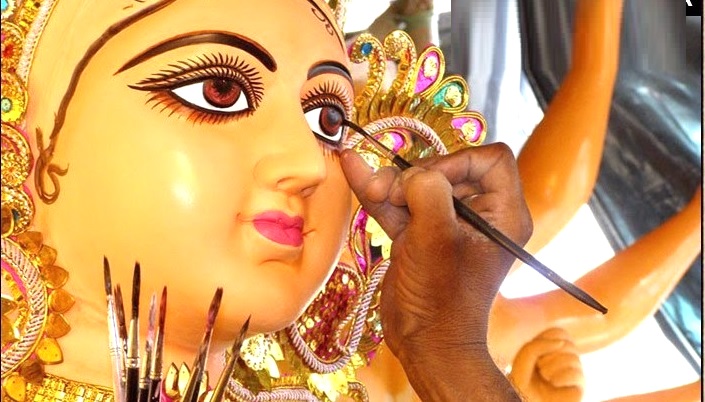
Jyoti
580 views
add comment
In Art the hand can never execute anything higher than the heart can imagine-Ralph Waldo Emerson
Navratri, as the name denotes, is a 9 night long festival. It is a prayer to Goddesses Durga, Lakshmi & Saraswathi, the many avatars of the supreme goddess Shakti. The girl child, is considered as an incarnation of Goddess Shakti .It IS CELEBRATION TIME IN INDIA. The Navratri2024 season is on. People are looking forward to festive cheer & fun .
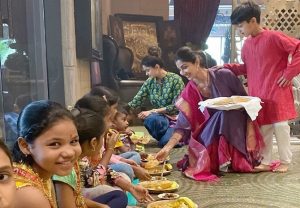
Each Indian State has a unique and distinct tradition of celebrating Navratri.
However, there are 5 common themes that merit consideration across India.
Skilled artisans create exquisite crafts & idols that depict Navratri. Idols are installed in the pandals/marques. As a matter of fact, there are identified villages and communities that are involved in making the idols. Let us look at some of the villages where the artists are busy creating idols and crafting magic with their fingers.
As we are all aware, Durga Puja is the most important festival in West Bengal. Starting from the 6th day till the 9th day of Navratri, the whole State is in a festive mood. Idols of Goddess Durga is erected in Pandals & marques.
Folklore has it that the goddess takes the form of a demon in order to kill the demon(asura) king Mahisasura. She is hence referred to as Mahishasura Mardini. For 9 days ,people worship Goddess Durga with music, dhol, conch shells, singing & dancing.
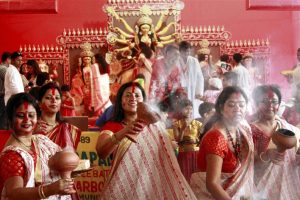
Married women dance as they participate in Sindur Khela on the last day of Durga puja celebrations
The artists prepare idols of the Goddess Durga slaying the demon in a variety of shapes & sizes. Some sitting atop a lion & some killing the demon and so on. The materials used vary from mud to paper and wood. The lifelike idol of goddess Durga is really a work of art.
Artisans who make the Durga idols come from a village called Kumartuli in Kolkata. Kumartuli literally means “potter community”. About 100 -200 potter families live in that area.
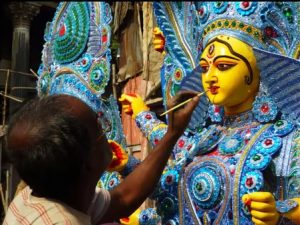
Kumartuli Village
Firstly, bamboo is used to make the frame of the idol. Further, it is wrapped with straw to give it a firm structure. After that, clay is mixed with soil and is plastered on top of the bamboo frame. Finally, the idol is dried and painted. As a matter of fact, some of the idols are wrapped with silver foil before the paint. Generations have been involved in making these exquisite idols in the Kumartuli village. The craftsmen and women excel in drawing out the eyes, nose & lips that give it the essential character.Sculpting the various postures of the goddesses is amazing. It takes remarkable talent to craft something so magnificent. Multiple forms of the idols are available in a variety of colours. The idols are placed in Durga puja pandals and also in palatial Kolkata homes as well.
In Chennai & Bangalore, it is considered auspicious to invite people home during Navratri. Pujas for the goddesses Lakshmi, Saraswati & Durga are held in the mornings. There is a colorful display of mud dolls (golu dolls) in homes for 9 days. The magic of Indian mythology is exhibited through the dolls. Themes from the Ramayana, Mahabharata & several other epics are beautifully displayed in this manner.
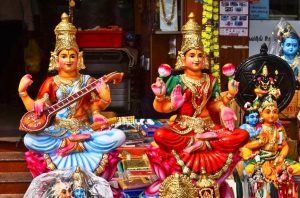
Homes are cleaned & decorated. Music is central to Navratri celebrations. Women sing Carnatic vocal music and play the violin, the dhol (mridangam) & flute It is an auspicious beginning for children to start to learn performing arts in this season.
The mud dolls & figures are made in a village named Velichari, near Madurai in Tamil Nadu and in a village near Kumbakonam. The entire village is involved in making the beautiful mud dolls. It is a cottage industry. Traditionally, the dolls are made from clay. However, today, papier mache is also used as it is lighter. The clay is molded into the desired shapes with the identified mold. Subsequently it is then evened out for imperfections. The finished piece is left to dry in the sun. The molded clay is subsequently painted in amazing bright colours that befits the subject. As a matter of fact, the doll collection includes chariots, animals, temples and entire scenes from mythology. The sizes vary from 6inches to 3 feet.
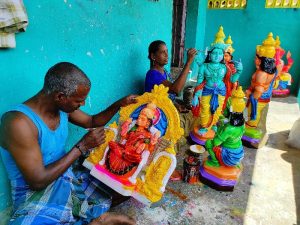
Velichari Art Studio
Navratri starts with the Kalash (metal pot) puja in individual homes. A small idol of goddess Durga is installed on the Kalash and a daily puja /worship with flowers and fruits is undertaken. Unmarried young girls are invited home and food and clothing are distributed to them.
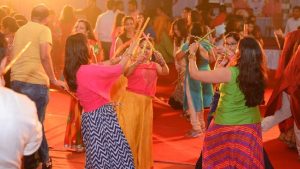
According to the legend of Ramayana, Ravana, the 10 headed demon king of Sri Lanka, abducted Lord Ram’s wife Sita. Lord Ram defeated Ravana to take Sita back. Dussehra is a celebration of Ravana’s defeat. Hence, on the 10th day, the effigies of the demon king Ravana and his brothers Kumbakarna & Meghnath are burnt.
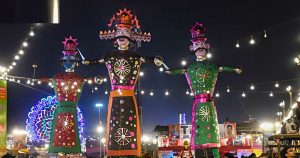
Towns & villages enact plays on the Ramayana. The community joins in the celebrations. People from all walks of life participate in the plays. The biggest celebrations are conducted on public grounds. Towards the end of the play, Lord Ram kills Ravana with his magic arrow. When Lord Ram’s arrow hits the demon Ravana, fire crackers placed inside go up in smoke. Symbolically, this represents victory of good over evil.
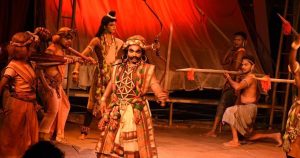
Statues of Ravana are made in Beriwala Bagh in Subash Nagar and in Tagore Garden in West Delhi. The materials are Iron mesh, bamboo & paper. Firstly, the skeleton is made with bamboo. This is the most important step. The frame is then made according to the size & the shape. Further, layers of paper are stuck on the top. At times, cloth is also used instead of paper. Finally, painting is done in vibrant colours while highlighting the eyes and lips.
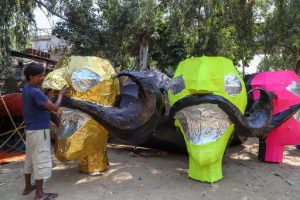
Ravana Head
All of the artists are very gifted and their creativity and skill are on full display during the Navratri season. It is interesting to note that they are seasonal artists who find employment outside after the Navratri season. As a matter of fact, generations of families excel in thiis craft.
Other Blogs on Dusshera, Durga Puja and Navratri
TOP 6 FESTIVALS OF INDIA
The Conch Shells & Dhol drums in Durga Puja
Don’t miss the Dasara Celebrations in Mysore
Navratri is a time to promote Arts & performing Arts
It is in honour of goddesses Durga, Lakshmi & Sarasvati.
Be the First to Know. Sign up to newsletter today